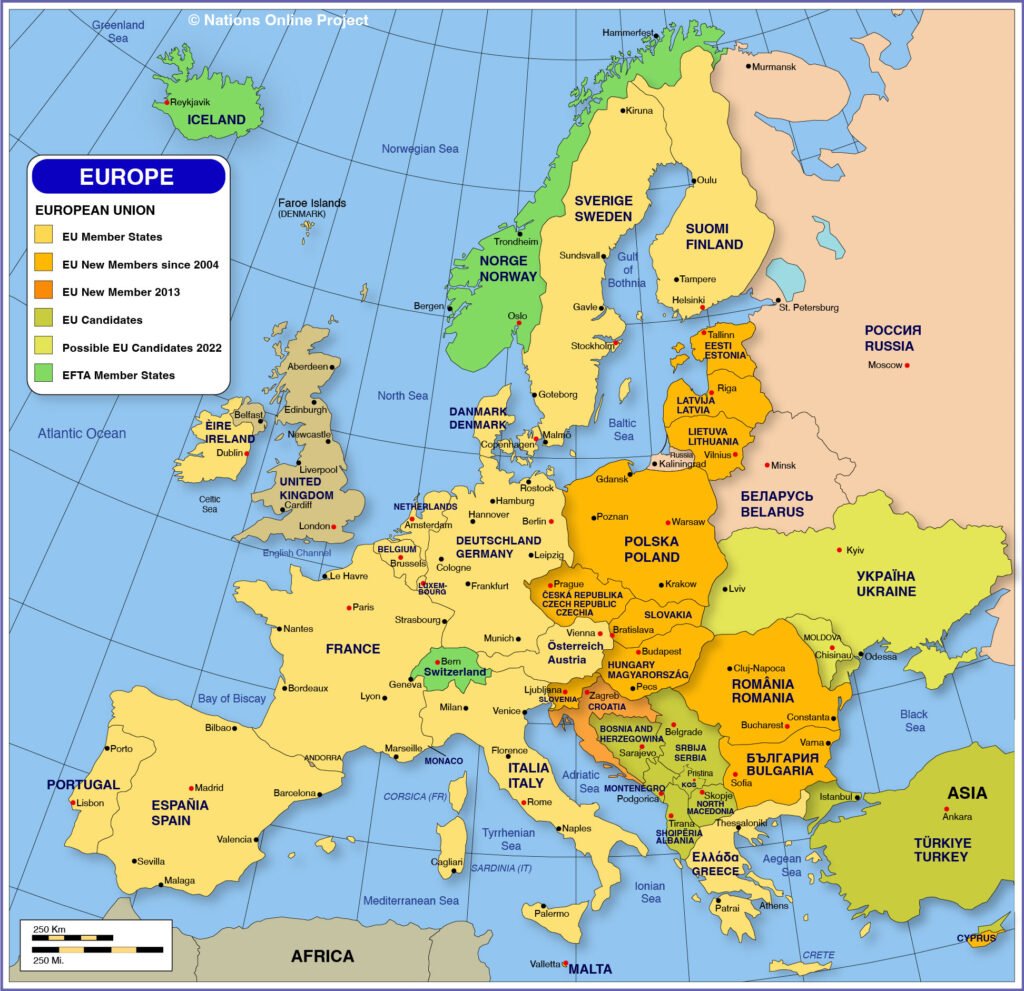How To Get Residency In Ireland: A Comprehensive Guide
Capital: Dublin
Population: 5,308,000 (2023)
Ethnic Groups: 76.6% White Irish, 10.8% Other White, 3.3% Asian, 1.5% Black
Area: 70,273 km2 (118th)
Offical Language: English
Currency: Euro
GDP per Captial (PPP): $131,175 (2024, 3rd)
Human Development Index: 0.949 (2023)

Country Profile:
Ireland, situated at Europe’s westernmost edge and embraced by the Atlantic Ocean, is a nation of striking landscapes and dynamic change. While approximately 40% of its population resides in the Greater Dublin area, the country as a whole has undergone a remarkable transformation. For much of the 20th century, Ireland was among Europe’s poorest nations. Today, however, it stands as one of the world’s most highly developed countries, with a GDP per capita consistently ranking in the global top three.
Ireland is an active member of both the European Union (EU) and the Organisation for Economic Co-operation and Development (OECD). Notably, it is not a member of NATO or the Schengen Area, maintaining a distinct position in international affairs. Following Brexit, Irish passport holders gained a unique advantage: they are now the only individuals globally who can enjoy the dual benefits of both the Commonwealth and the European Union.
Despite its economic successes, Ireland has recently faced significant domestic challenges. The country has experienced a substantial influx of immigrants, which has contributed to a sharp rise in the cost of living, particularly in Dublin. This demographic shift has also unfortunately led to a growing anti-immigrant sentiment within the nation.
Visa & Immigration System:
Ireland’s residency permit system includes both short-term and long-term permits.
Non-EU nationals who wish to stay in Ireland for more than 90 days need to apply for a local long-term residence permit, known as the Irish Residence Permit (IRP).
Ireland distinguishes the types of long-term residence permits with different stamps, mainly as follows:
Stamp 0: Issued to financially independent retirees, university teachers, overseas relatives of Irish residents, etc. Holders cannot work, do business, or receive government benefits in Ireland.
Ireland’s passive income visa: the Independent Means Visa, falls under the Stamp 0 category.
Stamp 0 is only a short-term residence visa. Holders cannot use it to apply for permanent residency or citizenship in Ireland, and it does not include options for accompanying relatives.
Stamp 1: Issued to those working, on working holidays, self-employed, or doing business in Ireland.
This category includes two additionally subcategories: Stamp 1A for accountants and Stamp 1G for graduates and spouses of highly skilled individuals.
Stamp 2: Student visa.
Stamp 3: Issued to non-working individuals who need to stay in Ireland for a period for special reasons, such as volunteers, priests, NGO personnel, and family members of work visa holders.
Holders of this visa category need to apply for a work permit if they wish to work in Ireland.
Stamp 4: Issued to refugees, investors, workers who have stayed in Ireland for a period on a work visa, and family members of Irish citizens.
The Start-up Entrepreneur Programme visa and the Irish Immigrant Investor Programme (IIP), which was canceled in 2023, fall under the Stamp 4 long-term residence permit.
Stamp 5: Another form of permanent residency, issued to foreigners who have legally resided in Ireland for a total of 96 months under Stamp 1, Stamp 3 (volunteer category), or Stamp 4 (investment category).
Stamp 6: If your passport bears the Stamp 6, it indicates that you are a dual national holding Irish citizenship.

In summary, aside from family reunification, work, and student visas, there are two principal ways for foreigners to legally reside in Ireland:
1. Independent Means Visa (Persons of Independent Means): This is a passive income visa under Stamp 0, requiring applicants to be retirees or individuals with direct ties to Ireland, such as overseas relatives of Irish residents, with an annual income of at least 50,000 euros.
The Irish Independent Means Visa is valid for one year and can be renewed under the same conditions. However, this visa does not allow holders to apply for permanent residency or citizenship in Ireland.
2. Start-up Entrepreneur Programme (STEP): This program requires applicants to invest at least 50,000 euros in start-up capital to establish a company in Ireland.
The Irish start-up visa does not have high investment requirements, but an independent committee will evaluate your business plan to decide whether to issue the visa. You need to provide a business plan that impresses the reviewers.
Additionally, if the newly established company can create more than 10 jobs in Ireland, achieve a turnover of over 1 million euros within three years, and meet other requirements related to innovation and leadership credibility, you can apply for an enhanced version of the start-up visa: the High Potential Start-Up (HPSU) visa.
Dependents:
Holders of Stamp 0 and Stamp 2 visas cannot bring dependents into Ireland.
For other Irish visas, the primary applicant’s spouse and children under 18 can also settle in Ireland as dependents.
Permanent Residency & Citizenship:
Foreigners holding immigration visas under Stamp 1 or Stamp 4 who have legally resided in Ireland for five years, with a total absence of no more than six months per year, are eligible to apply for permanent residency in Ireland.
Foreigners who have legally resided in Ireland for five years within the past nine years, continuously lived in Ireland for the year prior to the application (with absences not exceeding 70 days), and meet other conditions, are eligible to apply for Irish citizenship.
Passport Utility:
Ireland recognizes dual citizenship, and its passport is ranked 3rd globally. Holders can travel freely (either visa-free or with visa on arrival) to 189 countries and territories worldwide. (July 17th, 2025)

Useful Links:
Irish Independent Means Visa:https://www.irishimmigration.ie/coming-to-live-in-ireland/i-want-to-retire-to-ireland/
Ireland Start-up Entrepreneur Programme: https://www.irishimmigration.ie/coming-to-work-in-ireland/what-are-my-options-for-working-in-ireland/coming-to-work-for-more-than-90-days/start-up-entrepreneur-programme-step/
Official STEP Programme Guide: https://www.irishimmigration.ie/wp-content/uploads/2023/09/STEP-Guidelines-Sep-2023.pdf